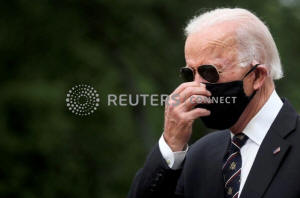As racial tensions turn violent, a careful balancing act for Biden
 Send a link to a friend
Send a link to a friend
 [June 02, 2020]
By Trevor Hunnicutt and Joseph Ax [June 02, 2020]
By Trevor Hunnicutt and Joseph Ax
WILMINGTON, Del. (Reuters) - The
demonstrations convulsing U.S. cities have forced Democratic
presidential candidate Joe Biden to strike a careful balance between
validating anger over police mistreatment of minorities while condemning
violence as a response.
In one city after another, thousands have vented outrage in sometimes
violent clashes over last week's death of George Floyd, a black man
shown on video gasping for breath as a white Minneapolis policeman knelt
on his neck.
For Biden, the protests represent a chance to advance his campaign's
core argument: that he is an empathetic leader who will bring a sense of
calm after years of deep polarization under President Donald Trump.
But the moment is also fraught for a candidate whose path to victory
relies on stitching together a coalition that includes both young
activists seeking sweeping policing reform as well as more moderate
voters who want order restored to their neighborhoods.
"This is the case for Joe Biden: He can be a uniter, he can be a safe,
trusted voice, but he can also signal a return to some sanity around
race politics for some people who have been turned off by the Trump
era," said Joel Payne, a political strategist who oversaw
African-American advertising for Hillary Clinton's 2016 presidential
campaign.
Trump, a Republican, has shown little interest in conciliation, instead
returning to the law-and-order theme that animated his campaign four
years ago, while accusing the "radical left" of fomenting violence - a
message that may resonate with some voters if the unrest continues
unabated.
At the White House on Monday, Trump said states needed to use
"overwhelming" police presence to quell protests and warned he would
deploy the military if needed to "quickly solve the problem."

Biden, who was vice president under Barack Obama, the first black U.S.
president, has said he decided to run for the White House after hearing
Trump say there were "fine people on both sides" of the violence in
Charlottesville, Virginia, where white supremacists and neo-Nazis
marched in 2017.
Biden supporters say he can offer reassurance to all Americans by
expressing solidarity with the anguish on display without endorsing
violent solutions.
"We have to help white suburban Americans understand that this is a
human life and what if it was your son, or your brother, or your uncle,"
said Representative Val Demings, a black former police chief and
Democrat from Florida being considered as a running mate for Biden.
"This is wrong, and it does not excuse the destruction of human
property, but his life was worth more."
After visiting with community and faith leaders in Wilmington, Delaware,
on Monday, Biden hosted a conference call with several mayors to discuss
the protests.
"Protesting is a natural American response to injustice, but burning
down communities is not," he said.
Black Democratic leaders, including Representative John Lewis, a civil
rights hero, and Obama, have struck the same tone, voicing support for
peaceful protests and denouncing violence.
[to top of second column]
|

Democratic U.S. presidential candidate and former Vice President Joe
Biden is seen at War Memorial Plaza during Memorial Day, amid the
outbreak of the coronavirus disease (COVID-19), in New Castle,
Delaware, U.S. May 25, 2020. REUTERS/Carlos Barria/File Photo

WINNING OVER WARY VOTERS
Biden on Tuesday will give remarks in Philadelphia about the ongoing
civil unrest across the country, his campaign said.
On Monday, Biden said he would appoint a police oversight board in
his first 100 days in office.
But he may need to offer a more forceful policy response if he wants
to attract more activist voters. A community leader told Biden in
Wilmington that many young voters were wary of Biden over his
backing of a 1994 crime bill as a senator that some blame for more
incarceration of black people.
Angela Rye, a Democratic activist and former executive director for
the Congressional Black Caucus, said she was disappointed Biden had
not denounced police brutality more explicitly.
"I don't know how you soothe people, how you meet people where they
are, how you tell people: 'I feel your pain,' without saying where
their pain comes from," she said.
Biden often talks about being shaped in his early career by the
National Guard's deployment in Wilmington in 1968 after riots
following the assassination of civil rights leader Martin Luther
King Jr.
The National Guard was a source of relief for white residents but
was viewed with fear in black neighborhoods, Biden recounted in his
memoir. That year, Republican Richard Nixon won the White House
after promising to restore order in the streets.
In a statement to Reuters, Trump re-election campaign spokesman Tim
Murtaugh said: "Biden is so beholden to the most extreme, leftist
elements of his party that it took him four days even to mildly
criticize the widespread looting, violence, and mayhem happening in
many American cities."
Georgia-based political consultant Dominick Perkins said Trump would
"definitely try" to weaponize the issue of street violence against
Democrats.
But Payne said Biden simply needed to offer compassion and an
openness to reform to draw a winning contrast with Trump.
"He has to demonstrate a genuine interest in the solution, but there
needs to be an understanding that Biden is not going to be the
elixir," he said. "A lot of people are just frustrated - they want
change, and they want somebody to listen to them."

(Reporting by Trevor Hunnicutt in Wilmington, Delaware, and Joseph
Ax in Dorset, Vermont; Editing by Colleen Jenkins and Peter Cooney)
[© 2020 Thomson Reuters. All rights
reserved.] Copyright 2020 Reuters. All rights reserved. This material may not be published,
broadcast, rewritten or redistributed.
Thompson Reuters is solely responsible for this content. |